Items
topic_interest is exactly
economy
-
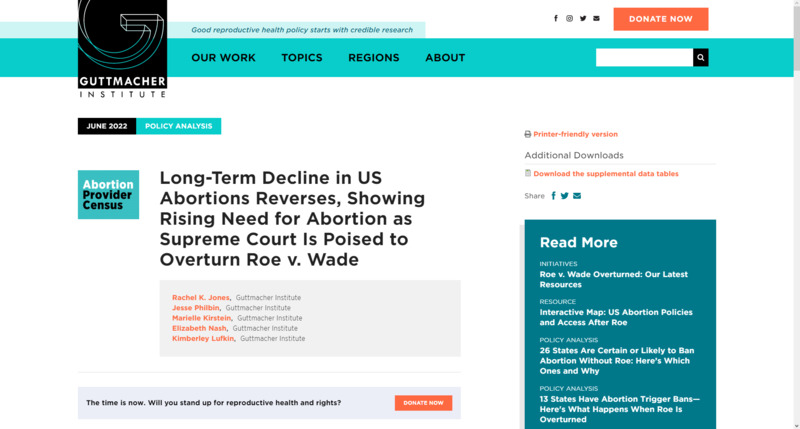 2022-06-15
2022-06-15Long-Term Decline in US Abortions Reverses, Showing Rising Need for Abortion as Supreme Court Is Poised to Overturn Roe v. Wade
This is a news story from The Guttmacher Institute. This article was written before the official Supreme Court decision was released on abortion. The article states that the 30 year decline in abortions has picked up with the threat of Roe v. Wade getting overturned. At the time this article is being entered in, Roe has been officially overturned by the Supreme Court. What is more interesting to me are the numbers given on abortions in 2020, when COVID was at its peak. In 2020, there was 930,160 total abortions, which was an 8% increase from 862,320 abortions in 2017. In 2020, about 1 in 5 pregnancies ended in abortion. The increase in abortions was marked in an overall 6% decrease in births between 2017 and 2020. The article does not discuss the social reasons why more abortions were happening in 2020 compared to other years, but in my own opinion, people's fears of hospitals being too full and the financial strain of lockdowns would have made it difficult to want to carry a baby to term. At the time, people were unsure of how long lockdowns and restrictions would last, so getting the pregnancy care needed to prevent issues giving birth would have been harder to come by. -
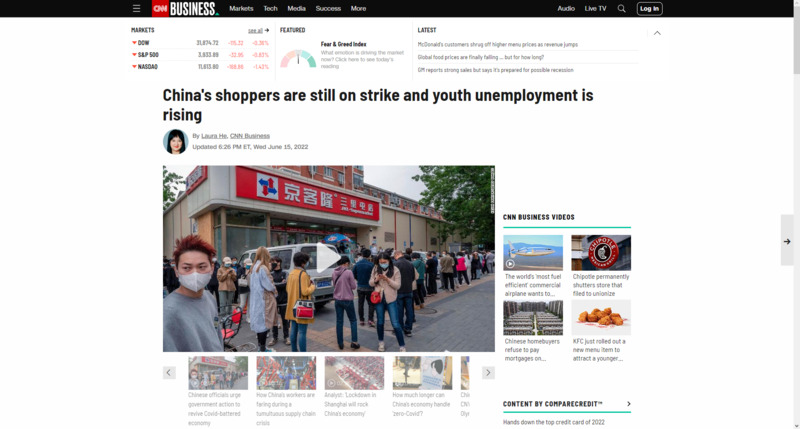 2022-06-15
2022-06-15China’s shoppers are still on strike and youth unemployment is rising
This is a news story from CNN by Laura He. This article is on the economic impact of China's zero COVID policy. Retail sales fell 6.7% in May according to China's National Bureau of Statistics. It is slightly lower than the 11. 1% drop in sales from April. Customer spending has fallen in about every category except for food, drink, and petroleum. Youth unemployment is rising in China, as places that would hire young workers were forced to shutdown with lockdowns. The youth unemployment rate rose 18.4% between the 16-24 range in China. -
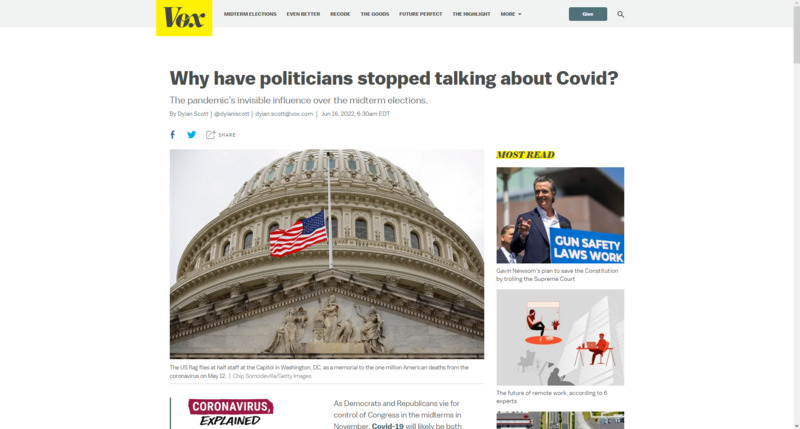 2022-06-16
2022-06-16Why have politicians stopped talking about Covid?
This is a text story from Vox by Dylan Scott. The article claims that COVID helped sink President Donald Trump's re-election campaign, yet despite this, it is not being focused on by either party. Though, this author believes the Democrat response hasn't been much better, with people not really touting President Joe Biden's vaccine rollout and other initiatives. The author links the reason for inflation being COVID interrupting supply lines, which is on people's minds for this midterm election. According to Gallup polling, COVID has lost importance in many people's minds, with it falling behind Russia and gas prices. On the Republican side of things, COVID is rarely mentioned, and if it is, it is in a negative light. Scott says that candidates favored by Donald Trump have gone against his ideas, with them being more skeptical of vaccines, and some refusing to get the vaccine at all. COVID is being tied to an anti-establishment attitude that has been rising within the Republican party. As for my own opinion on this piece, I believe that is does bring up an interesting point with linking COVID to current inflation. I do agree that COVID has impacted the economy for the worst with supply chains being more limited and rising spending of the federal government to counter it, but I do not think it can explain everything. Federal spending in general has been on an increase, which is driving up the cost of items, and not all that spending is COVID related. In addition to that, the shutdown of important pipelines has made reliance on foreign oil more of a necessity, which then drives up gas prices. These types of decisions can't all be traced back to COVID. So while I do think COVID has impacted the economy, I do not think it explains nearly all the economic issues the United States is facing. -
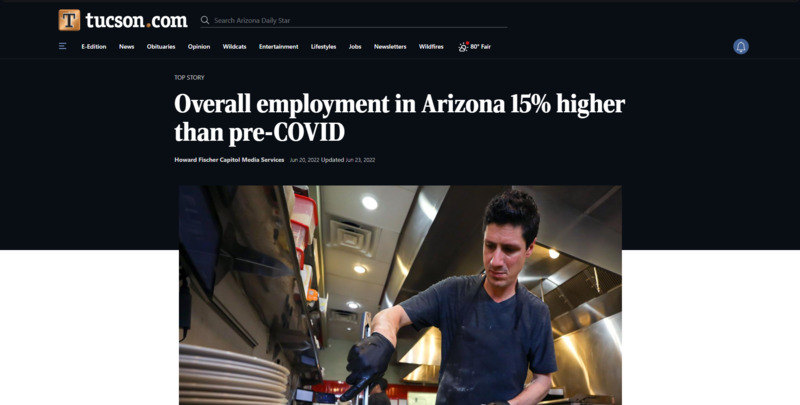 2022-06-16
2022-06-16Overall employment in Arizona 15% higher than pre-COVID
This is a news story from Tuscon.com. Overall, employment has risen by 15% compared to pre-COVID numbers. Bars, restaurants, and hotels have increased employment by 10.6% since last year. Permits issued for single and multi-family homes are down by about 16% compared to last year. There is also a 32.6% price increase on energy prices, being driven by rising gasoline prices. Overall, this article shows economic trends in Arizona and how COVID has impacted various industries and consumer trends. -
 2022-04-20
2022-04-20How COVID transformed trans-Pacific container shipping
This is a news story from American Shipper by Greg Miller. Due to COVID, our trade has changed. Data from Alphaliner shows how much the trade relationship between Asia and the United States has morphed. Carrier competition is up, with more players and less share from the three global alliances. In a breakdown of the data, Cosco was the trans-Pacific leader in mid-2020 as the United States was coming out of the first lockdowns. Maersk was at fourth place, carrying 30% less capacity than Cosco. In mid-2020, 2M, Ocean Alliance, and THE Alliance controlled 89% of trans-Pacific capacity. In 2021, that lowered to 82%. These alliances in 2022 now are at 67.7% of shares. -
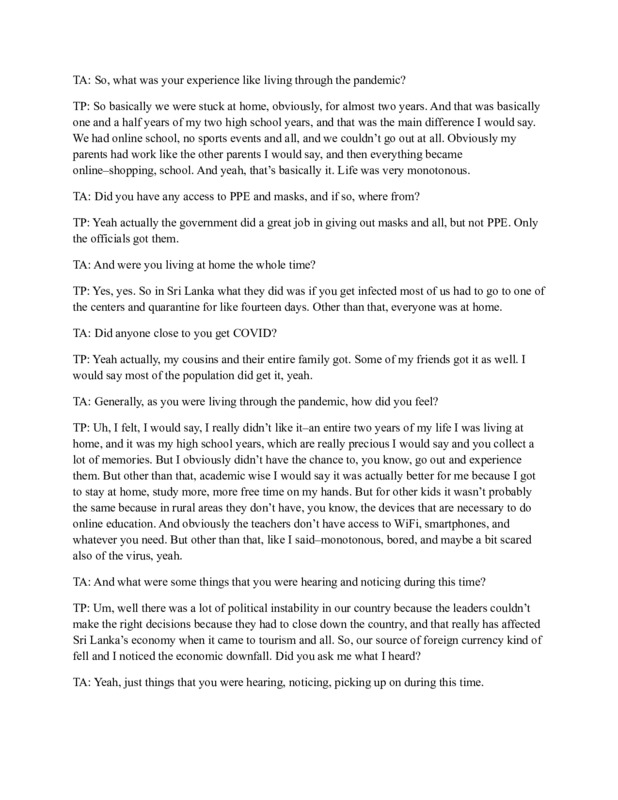 2022-05-04
2022-05-04Experiencing the Pandemic as a Student in Sri Lanka
It provides the pandemic perspective of a student from Colombo, Sri Lanka. -
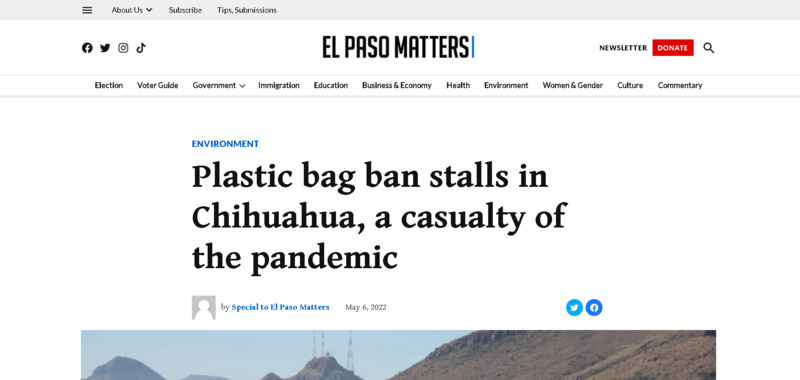 2022-05-06
2022-05-06Plastic bag ban stalls in Chihuahua, a casualty of the pandemic
This is a news story from El Paso Matters. This story is about Mexico's environmental issues that have risen due to COVID. In August 2019, Chihuahua became the latest state to ban single-use plastic bags. This changed with COVID, when household and medical waste rose to 80,000 tons per day. Fines for violating Chihuahua’s plastic bag ban range from 2,000 Mexican pesos ($97) to 250,000 pesos ($12,200). But authorities have refrained from enforcing it, noting that single-use items were necessary to meet coronavirus safety requirements. The pandemic’s negative impact on the economy and available workforce also presented obstacles, says Gilberto Wenglas Lara, director of ecology at the Ministry of Urban Development and Ecology. -
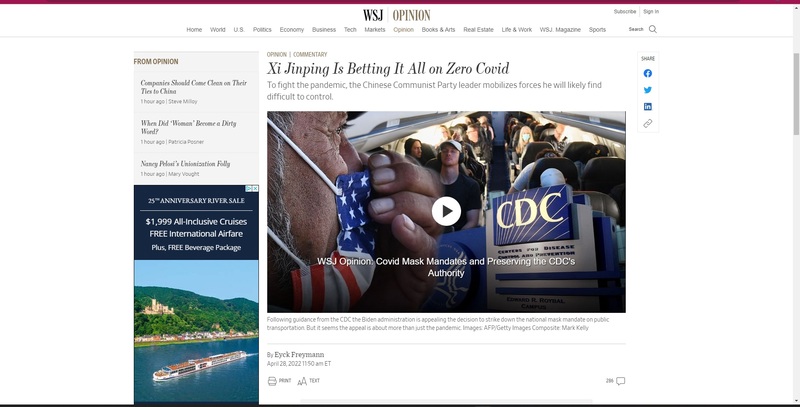 2022-04-28
2022-04-28Xi Jinping Is Betting It All on Zero Covid
This is a news story from The Wall Street Journal by Eyck Freymann. This article is about President Xi Jinping's zero COVID goal. The author argues that this is a risky move for President Xi, as enforcing a zero COVID policy could have many economic ramifications. As of Monday, 45 cities with 373 million people, representing 40% of China’s gross domestic product, were under partial or full lockdown, according to Nomura estimates. More cities and counties are under “static management,” a euphemism for quasi-lockdown. President Xi's COVID policy gets compared to Chairman Mao Zedong's Great Leap Forward, where it can start with a noble intention, but turn deadly for the population. Just like Mao faced great food shortages after the Great Leap Forward, locking down centers that produce a lot of the country's GDP is a risk too. -
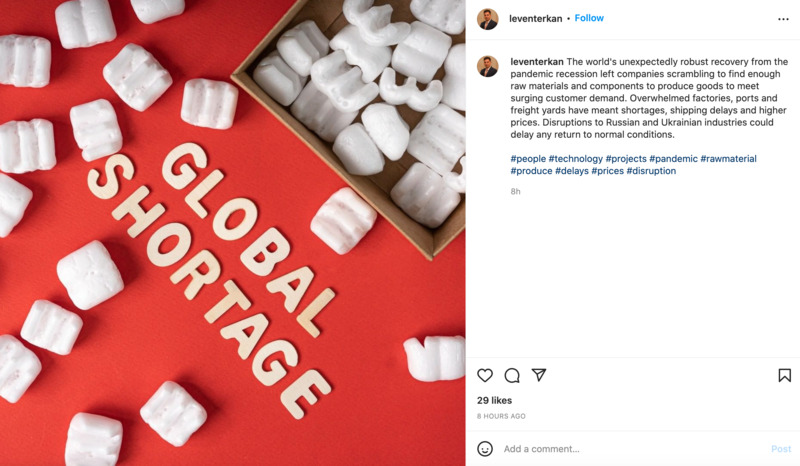 2022-04-07
2022-04-07Global Shortages
This is an Instagram post by leventerkan. This user brings up the problems with shortages of raw materials as a result of the pandemic. Due to these shortages, prices of items have also been rising, leading to more inflation. At the end, it talks about how the war between Russia and Ukraine is making the supply chain issues even worse, as it is freezing up some industry, which could delay any return to normal conditions. -
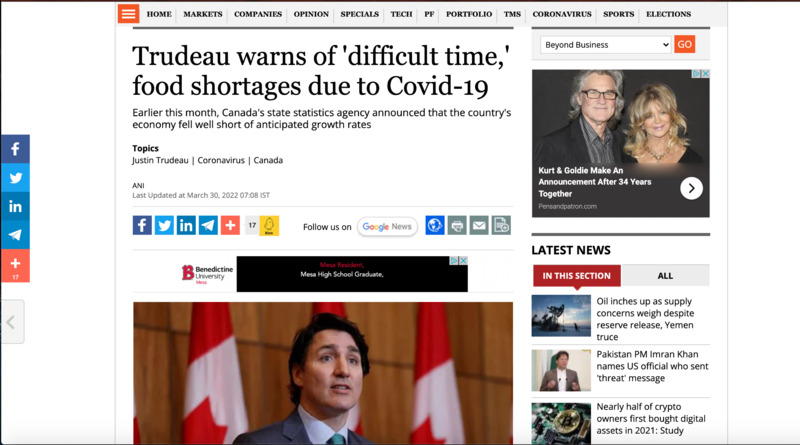 2022-03-30
2022-03-30Trudeau warns of 'difficult time,' food shortages due to Covid-19
This is a news story from the Business Standard. This is about the after effects of COVID on the Canadian population. Prime Minister Justin Trudeau warns that it will be a difficult time with food shortages due to COVID. Some of the blame for the food shortages is also placed on Russia's invasion of Ukraine. Similar tactics of blaming President Vladimir Putin for the rising prices of goods has also been used by President Joe Biden. The global disruption of supply chains results in higher prices of necessities. Earlier in March, the Canadian government announced that the economy fell short of its anticipated growth for that month. In February, inflation in Canada rose by 5.7%, the highest increase since August 1991. -
 2022-04-03
2022-04-03COVID: China struggles to contain large outbreak
This is a news story by DW News. It is a story about how the outbreak of COVID has not been very well controlled in China, with China reporting 13,146 new cases, the most since the beginning of the pandemic in 2020. Despite these numbers, the Chinese government has claimed that there have been no new deaths despite the high number of infections. Shanghai is the worst affected region in China, in which as city of 25 million has been under lockdown. Vice President Sun Chunlan, who is on the Communist Party's Politburo claims that swift actions taken will help stop the spread of the virus. In Beijing, there have been lockdowns, mass testing, and travel restrictions placed on the populace. Residents of Shanghai are worried about the lockdowns exceeding four days, as it will limit their ability to obtain fresh food. Parents also fear being separated from their children for too long under strict quarantine. The article mentions Xi being in tough spot with this too, as these lockdowns will have an ill effect on an already fragile economic situation. -
 2022-03-30
2022-03-30Have a Wedding Budget? Expect to Spend More Because of Inflation
This story from the New York Times by Danielle Braff talks about the rising costs of weddings as a result from COVID. Couples mentioned in this story go on about how just the basics are more expensive than they used to be. Ms. Alvear-Beceiro and Mr. Klebba, despite not spending extra on things like food, decorations, and music, had a wedding budget that topped $30,000. Zola, a wedding planning site, said that a third of the 468 participating vendors had losses of $50,000 or more due to couples postponing weddings in 2020. Supply chain shortages later on have also helped increase the overall costs, and many businesses are still trying to operate to pre-pandemic levels. Due to rising costs, some couples are choosing to scale back the festivities. Shannon Bernadin, after looking at the costs of wedding venues with her husband, decided to have a wedding at a friend's house and use thrifted outfits, along with homemade decor. All in all, this article demonstrates the changing economy and how that has impacted the wedding industry and how people plan weddings. -
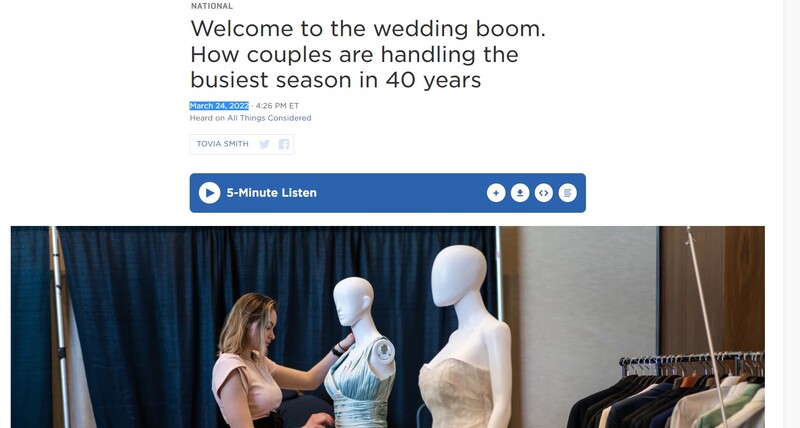 2022-03-24
2022-03-24Welcome to the Wedding Boom. How Couples are Handling the Busiest Season in 40 Years
This is a news story about the rising amount of weddings happening in 2022 after some couples have had to put them off. This story by NPR details changing wedding trends along with it. Wedding dress retailers such as David's Bridal say the demand for maternity wedding dresses is at a 10% increase. Wedding site, The Knot, has had a 25% increase. Financial stress in planning these weddings has also increased. Mandy Connor, a wedding planner, notes that one of her clients was hit with a 30% increase in overall cost between the contracted estimate and the final bill. This article does a good job at showing changes in wedding trends based on how retailers are reacting. -
 2021-07-05
2021-07-05Lockdowns Were a Gift to Big Business Designed to Kill Small Biz
This is an opinion piece by Carol Roth for the New York Post. This news story is about ways in which the lockdowns in 2020/2021 hurt small businesses, but helped big businesses. Roth claims that during the pandemic, small businesses are hitting half or less than half of their pre-lockdown revenue. Some businesses, Roth claims, possibly won’t recover at all. This article says that in 2020, the Hamilton Project accounted for 400,000 closures. I find this article to be important, as I think the business side of the pandemic needs to be told more, as these effects on small businesses impact the local and state economies, in addition to what jobs are available for people looking to go back to work after lockdowns end. -
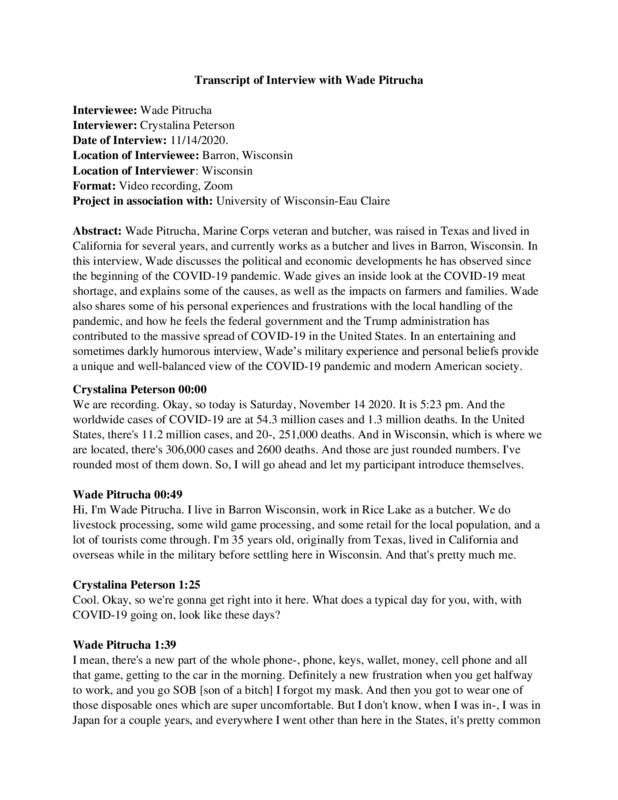 12/01/2020
12/01/2020Wade Pitrucha Oral History, 2020/12/01
Wade Pitrucha, Marine Corps veteran and butcher, was raised in Texas and lived in California for several years, and currently works as a butcher and lives in Barron, Wisconsin. In this interview, Wade discusses the political and economic developments he has observed since the beginning of the COVID-19 pandemic. Wade gives an inside look at the COVID-19 meat shortage, and explains some of the causes, as well as the impacts on farmers and families. Wade also shares some of his personal experiences and frustrations with the local handling of the pandemic, and how he feels the federal government and the Trump administration has contributed to the massive spread of COVID-19 in the United States. In an entertaining and sometimes darkly humorous interview, Wade’s military experience and personal beliefs provide a unique and well-balanced view of the COVID-19 pandemic and modern American society. -
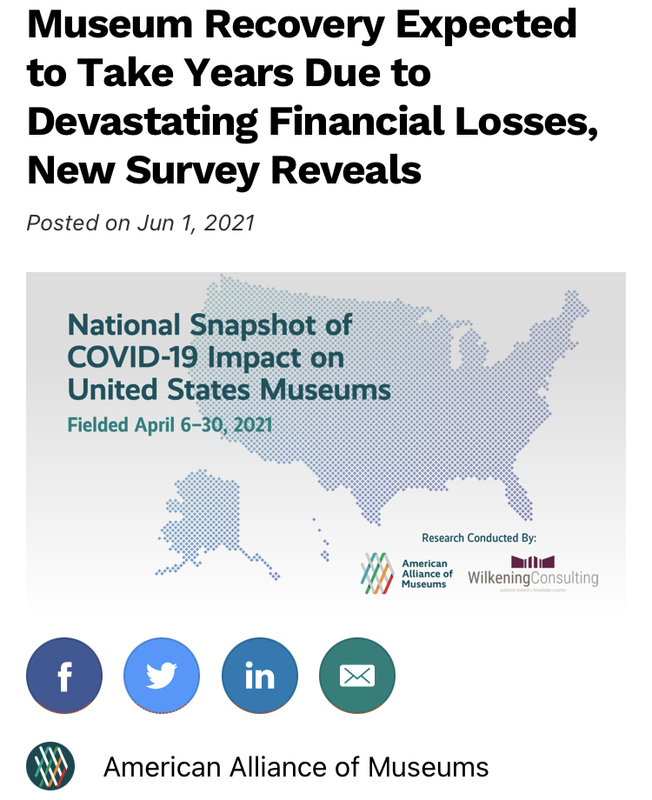 2021-06-01
2021-06-01Museum Recovery Expected to Take Years Due to Devastating Financial Losses, New Survey Reveals
The American Alliance of Museums report highlights financial problems and some of the more negative long-term impacts resulting from COVID-19 such as reduced overall net revenue for the institution, lower employment numbers, and lower average salary for their staff members. -
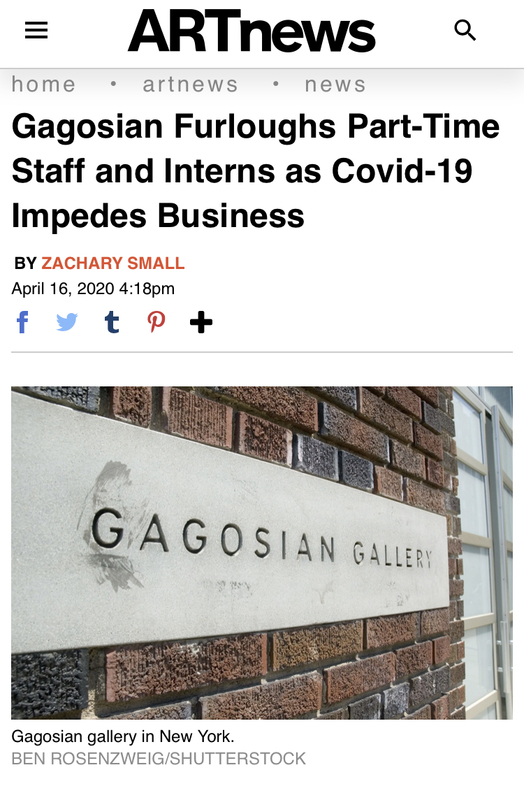 2020-04-16
2020-04-16Gagosian Furloughs Part-Time Staff and Interns as Covid-19 Impedes Business
All galleries felt the immense economic pressure of shuttering their doors. There was uncertainty and furloughs or imminent possibility of losing ones job was a looming presence especially in the spring of 2020. Even international blue-chip galleries like Gagosian were financially struggling. Those that lost their jobs were The article discussed job loss - whose jobs - and what this means for the art world in the present and in the future. Other methods of main tenting financially during the pandemic included furloughs and salary cuts where the percentage was determined by how much someone made per year. -
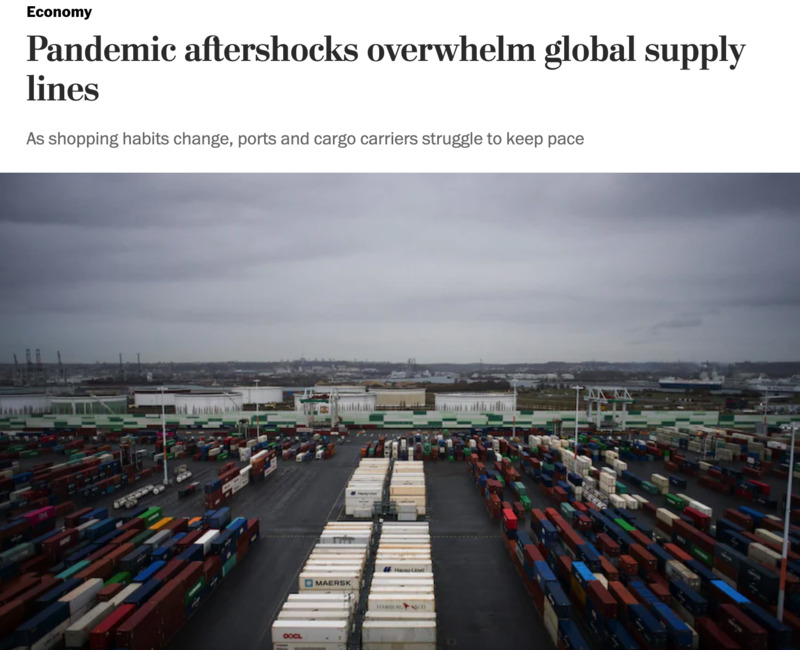 2021-01-24
2021-01-24Pandemic aftershocks overwhelm global supply lines
The Washington Post article discusses the disruptions in the supply chain and the repercussions such as inflated prices, failure to meet schedules, and effects on different industries. The domino effect was set off by the pandemic but we continue to see the fallout. Shipping artwork is a cost that galleries, advisories, collectors, and museums have to factor into their finances. Inflation in the cost of international shipping in particular and unpredictable delays negative effect openings and coordinating with clients and vendors. -
2020-06-07
Much too early
The country was clearly still in distress when governments decided to reopen -
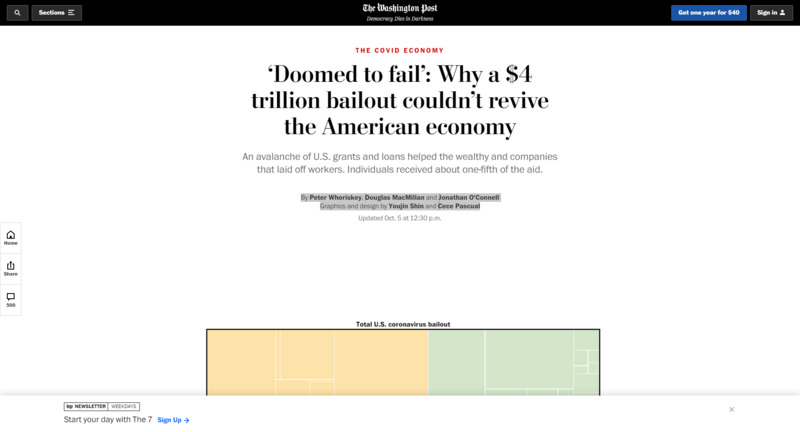 2020-10-05
2020-10-05Who Received Pandemic Money?
This article shows how the economic bailouts of the pandemic helped large corporations much more than they helped impacted individuals. Since the beginning, we've seemingly been supporting and encouraging essential workers. The support can be identified as fraudulent because according to the Washington Post, big companies that employ essential workers didn't use their bailout funds to support their workers. Billions of dollars went out but aid is still running low where it matters the most, with hardworking citizens. -
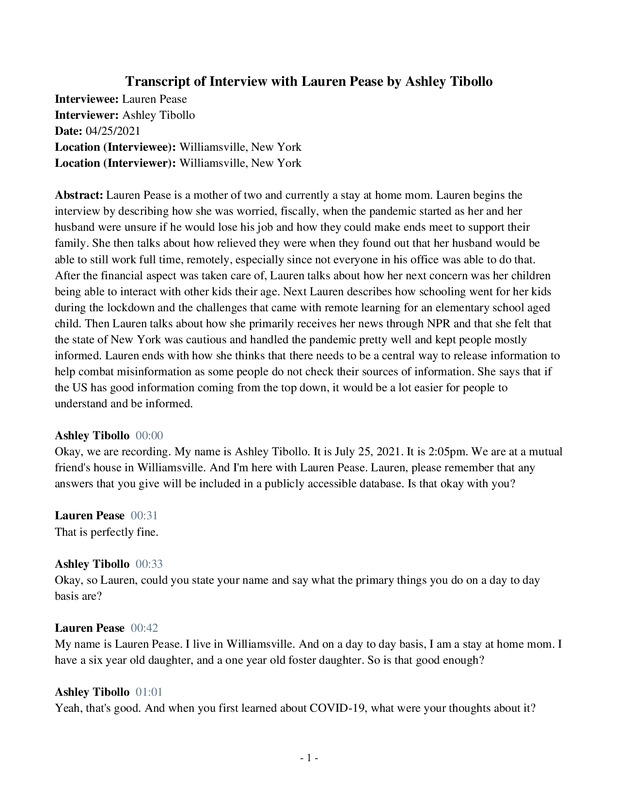 07/25/2021
07/25/2021Lauren Pease Oral History, 2021/07/25
Ashley Tibollo interviewed stay-at-home mom, Lauren Pease about her experience with the Covid-19 pandemic. In this interview, they discuss her experience with the lockdown, her worries about the pandemic, and what life was like during lockdown with her foster child. This interview also touches on political protests, virtual learning and her husband's transition to working from home. -
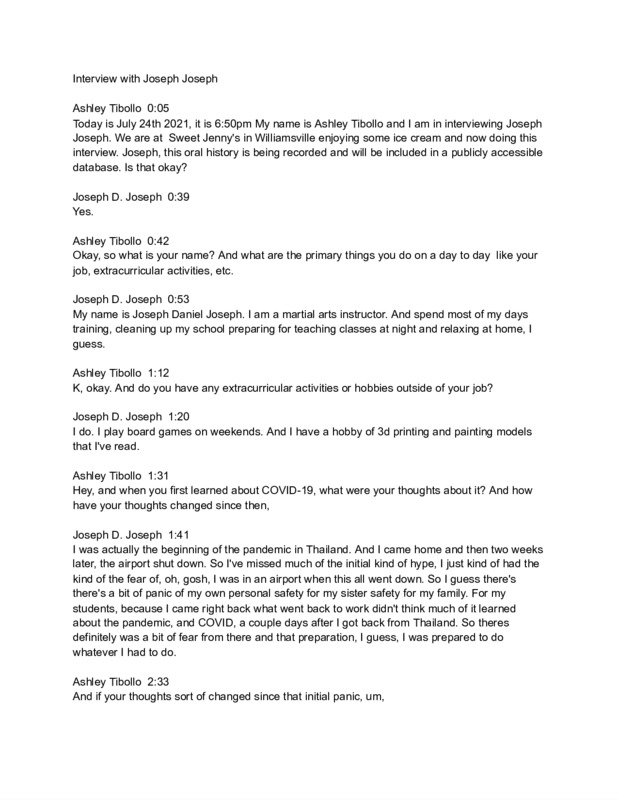 2021-07-24
2021-07-24Joseph D. Joseph, Oral History, July 24, 2021
Ashley Tibollo sits down with Joseph D. Joseph in an ice cream shop in Buffalo, New York to discuss how his life has been affected by the COVID-19 pandemic. In this interview, Joseph describes changes in his day-to-day routine, his life as a martial arts instructor, and changes in his economic status. He also discusses his students and how the pandemic affected them. In the last part of this interview, Joseph discusses his views on politics and what he hopes the future generations will learn about the response to this pandemic. -
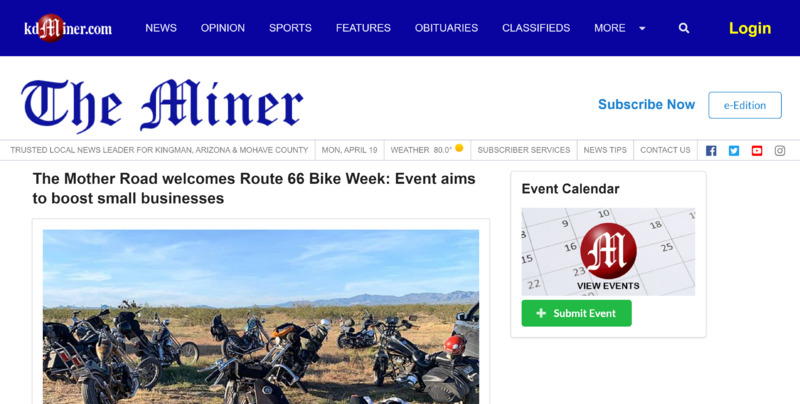 2021-04-15
2021-04-15News Article: The Mother Road welcomes Route 66 Bike Week: Event aims to boost small businesses
By Travis Rains, Kingman Daily Miner, 15 April 2021 Communities and businesses along and near the Mother Road wanted in on the action that is Route 66 Bike Week – five days of activities, games, discounts, scenic biking and more set for April 21-25 along the historic highway from Needles, California to Seligman. Event organizer Rob Borden is no stranger to motorcycle rallies as the owner of Saddle Sore Ranch, located between mile markers 36 and 37 on Route 66, approximately 17 miles from Kingman. But this is the first year for Route 66 Bike Week, which has seen the expansion of what has been dubbed the “Laughlin Loop.” “It kind of started by accident,” Borden said, noting the loop includes Route 66, going through Oatman and down over highways 95 and 68. “It’s just a nice, scenic ride for motorcycle enthusiasts. With the Laughlin River Run not happening, at least not in the past two years, I got a call from Needles, California from their tourism center asking if they could be included in this Laughlin Loop and I said ‘absolutely.’” Borden then received a call from the chamber of commerce in Oatman seeking to be included in the event. Then the City of Kingman and its visitor’s center wanted on board, followed by Seligman. “So then I’m looking at it and I’m like ‘wow, Needles to Seligman,’” Borden said. “I said ‘why don’t I just do a Route 66 Bike Week,’ and that’s how it happened. That way we can promote all these small businesses down Route 66 that even in normal times they struggle. Now with COVID, of course, they’ve been struggling even more.” So Borden began reaching out to businesses along Route 66 to see if they would be interested in participating by way of deals and discounts for event participants. “They loved the idea and wanted to be a part of it,” he said. “Basically, the idea is rather than just have a stationary event that’s confined to some big parking lot, let’s kind of highlight these businesses up and down Route 66 and get them involved. They’ve put together special offers and discounts, maybe extra effort for bands for bars. Those are different stops on the rally.” Registration for bike week can be completed by going to http://route66bikeweek.com/, with prices ranging from $45 to $48 depending on the package chosen. Borden said there is associated costs for the event that include T-shirts, bike week wristbands and dissemination of the Route 66 Passport, the latter two providing participants with access to discounts from businesses and drawings for prizes, respectively. “So when you show up with your bike week wristband, you’ll get freebies and discounts,” Borden explained. “We’ve got about 20 free drawing stops.” A scavenger hunt is planned as well utilizing the Route 66 Passport. Borden said there will be five different stops along Route 66 at which participants can have their passports stamped. Upon getting all the stamps and presenting them at Rally Central, which is Saddle Sore Ranch, they will receive a free ticket for yet another drawing. Borden also said those wishing to cruise Route 66 during bike week don’t have to register, but that they will not receive access to discounts and more. “The intent there is obviously to bring exposure to Route 66 and all these businesses, and make a big financial impact right here to the area as opposed to some of the big corporate vendors that would come into big motorcycle events,” Borden said. “When they leave, they take the money with them.” Saddle Sore Ranch will play host to biker games and activities throughout Route 66 Bike Week. Those will include poker runs, live music and popular biker contests like a big belly contest. Biker games such as slow races, barrel races, lean-your-bike and more are scheduled as well, as is a blue collar build-off judging and awards ceremony sponsored in part by Cycle Source Magazine. The build-off is a low-budget motorcycle building competition where teams from all over the country had $1,500 and 30 days to build a bike. After the sun goes down, live music will continue, vendors will open up shop and a campfire party will commence. “It’s a lot different than what people are used to with previous motorcycle rallies in the area,” Borden said of Saddle Sore Ranch. “Our venue is more reminiscent of a ‘60s or ‘70s style, easy rider rodeo kind of venue. It’s more of a traditional, old-school biker venue as opposed to the neon lights and things like that of Laughlin. It’s a completely different kind of feel and a breath of fresh air for bikers in the area to give them something to do and something different.” Route 66 Bike Week starts at 10 a.m. Wednesday, April 21 and runs until 10 p.m. Sunday, April 25. For more information on Route 66 Bike Week, go to http://route66bikeweek.com/. -
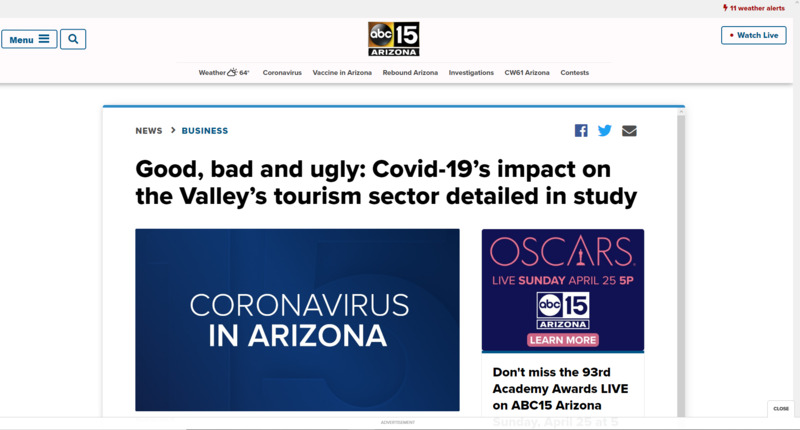 2021-04-13
2021-04-13Good, bad and ugly: Covid-19’s impact on the Valley’s tourism sector detailed in study
Over the last year, Arizona has seen the cancellation of major events due to COVID-19. These cancellations have had a major impact on business and tax revenue. The entertainment, hospitality, and food business have been hit the hardest. -
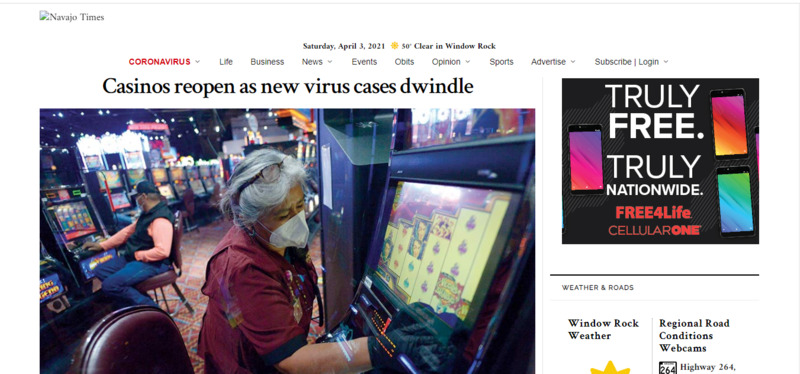 2021-03-25
2021-03-25Navajo Nation casinos reopen as new virus cases dwindle
By Donovan Quintero | Mar 25, 2021 | Business, CORONAVIRUS | CHURCH ROCK, N.M. Peterson Zah has a concern. On Tuesday, while hundreds of Fire Rock Casino patrons tried to win some money, the former Navajo Nation president wanted to hear what the COVID-19 public service announcement sounded like in Navajo. “I didn’t hear any of the PSA while inside because it’s so noisy,” he said. After taking a step outside the casino, the former Navajo Nation president said he was able to hear it. But that raised a concern for him. “And it’s pretty good,” Zah said, explaining the PSA in Navajo was clear and concise. “But you can only hear that clear outside and inside you can’t really understand it.” Zah said he was concerned no one would hear the COVID-19 safety guidelines everyone needed to follow. His other concern was that since many Navajo people have gotten both doses of the vaccines, many of them might become emboldened. “The reason why I was concerned is people have this attitude that because of the shots … they say, ‘Hey, I’m immune, I don’t have to worry about the virus.’ So when I go places I’m gonna take mine (mask) off,”’ Zah said Tuesday. According to the president’s office, more than 76,000 people have been fully vaccinated as of March 23 and more than 191,000 total doses have been administered. Zah didn’t think people should take any chances by easing up on protecting themselves from the contagious respiratory virus because some people were not wearing masks. After being closed for more than a year, Fire Rock Casino and Northern Edge Casino were on the fifth day of a two-week “soft reopening.” Just the gambling portion of the casinos were open at 25% capacity, and only Navajo Nation residents were allowed into the casinos, according to Navajo Gaming interim CEO Brian D. Parrish. Parrish clarified Navajo Nation residents meant everyone, including non-Natives, living on the reservation would have access to the casinos during the reopening phase. “We’re doing it with a two-phase reopening plan that started with Fire Rock and Northern Edge first,” he said. “We’re going to reevaluate with the Navajo Nation. They’re going to do audits and monitor our implementation of our workplace safety plan.” Of the 1,180 casino employees, 650 have returned to work since last Friday, said Parrish. Employees like Fire Rock Casino housekeeper Mildred Russell, who said she’s been out of work for over a year, were happy to be working again. “It’s been a struggle,” Russell said while cleaning a slot machine last Friday. “Hopefully this pandemic will be gone and everybody can go back to their normal lives.” Other employees, like casino security officer Vernon Keeswood from Hogback, New Mexico, shared Russell’s gratitude for getting the call to go back to work. “It’s good,” he said on Tuesday during a telephone interview that was arranged by Michele J. Crank, executive director of communications and public relations for Navajo Nation Gaming Enterprise. Instead of the usual hugs and shaking hands, Keeswood said, now it was “fist bumps” and “elbow bumps.” As for the reopening, he said many Northern Edge Casino customers “are pleased and happy” the Navajo casinos have begun reopening. He added a few customers were not sure if the casinos should reopen. “I hope everyone washes their hands and practices social distancing so we open to 100 percent capacity,” Keeswood said. “I hope it opens more.” After all, the threat of another COVID-19 outbreak looms on everyone’s mind, including that of Robert Peterson from Thoreau. “People are still afraid to come here but a lot of them want to enjoy being out instead of being stuck at home,” said Peterson, who said he lives alone, last Friday. Peterson said being alone and dealing with the pandemic has been hard for him. Despite his fears, he decided to head to Fire Rock to get his mind off COVID-19. Mary E. Silversmith, 79, from Lupton, Arizona, ensured no one came to visit her with a “no visitors allowed” sign posted on her hogan. She was happy to support the casino employees who returned to work. “The casinos were opened for the casino employees,” she said on Tuesday at Fire Rock. “Many of have children and they have bills to pay. “Because of that, I am OK with the reopening,” she said. “Some people have been criticizing the reopening. Not me, I don’t think that way or talk that way.” Before the pandemic, Silversmith said she frequently ate at Fire Rock, as well as at Twin Arrows Casino and Resort, when she had extra money to spend. Silversmith was wearing a surgical mask. To gain entry into both casinos during the soft reopening, a state ID, like a driver’s license, is required and a working number at which customers can be contacted. Temperature checks were also part of the requirements for anyone wanting to enter. After their temperature was checked, security asked customers to momentarily remove their masks and look at the front entrance security camera. The purpose of collecting all of the information is for contact tracing, said Parrish. “We have an excellent plan that’s in place,” he said. “We’ve had it reviewed and modified and enhanced by public health experts, not only on Navajo, but outside the Navajo Nation.” He added that Navajo Gaming invested close to $2 million in “equipment, supplies, signage, training,” to keep everybody safe. U.S. Indian Health Service officials toured both of the casinos’ kitchens on March 12, Parrish added, to review their safety procedures. “And in terms of reopening of the other properties, especially at a higher capacity percentage, that’s going to be based not only on how well the enterprise does, but what’s happening with the public health metrics, the rate of vaccinations on Navajo and other key indicators like that,” the interim CEO said. The Navajo Gaming enterprise’s careful planning even got praise from Jordan Schermerhorn, a senior research associate at Georgetown Center for Global Health Science and Security. Schermerhorn stated in an email to NNGE their plan showed the tribe was leading “the entire country in a smart, careful return to normalcy.” “Combined with the Navajo Nation’s outstanding vaccine rollout, this soft reopening shows what is possible with a data-driven pandemic response in a community dedicated to public safety,” Schermerhorn‘s email said. Even the ventilation, air conditioning and heating systems, which completely re-circulate the air inside the casinos 15 times a day, were reviewed, said Parrish. “We’re ready to go to fifty percent, we’re ready to offer food and we’re ready to bring the rest of our team back,” Parrish said. Zah watched casino patrons trying to win money as sounds from the Tuesday afternoon hustle and bustle all but drowned out the COVID-19 PSA. “So basically, the attitude shouldn’t be such now that because they got their shot they don’t have to worry about it,” he said. “It’s still around. Even though ninety percent of the people may be wearing their mask, or all of them, if one of them comes in that has it, then we’re in trouble.” Zah explained a new COVID-19 variant is much smaller than the original strain, which to him was why everyone needed to double mask. “If you can see light through your mask that means it’s gonna go through,” Zah said. “We gotta start wearing two masks.” He said he intends to go on KTNN and remind everyone not to run off to Phoenix or Albuquerque just because they’ve been vaccinated. “At the same time, they still have to follow those protocols,” he said. “I want to say, ‘You gotta start wearing double masks.’” As of Tuesday night, the Navajo Nation Department of Health reported a cumulative 30,010 cases of the virus and 1,233 deaths. -
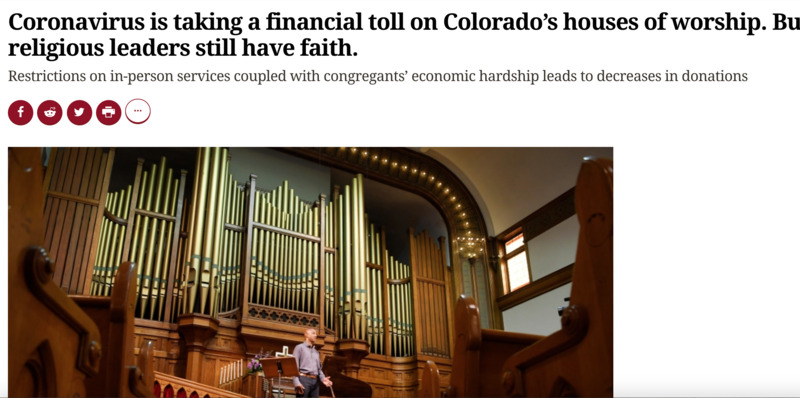 2020-05-17
2020-05-17Coronavirus is taking a financial toll on Colorado’s houses of worship. But religious leaders still have faith.
During the pandemic, many places of faith are on the verge of closing their doors permanently. As people lost jobs, giving obviously declined. Because houses of worship rely entirely on giving, this has created a crisis for many churches, mosques, synagogues, and temples. These houses of faith still have bills to pay, they have employees to pay, and the vast majority of these houses of faith contribute significantly to their community. This article speaks to the uphill battle being faced specifically by places of faith in Colorado during the pandemic. -
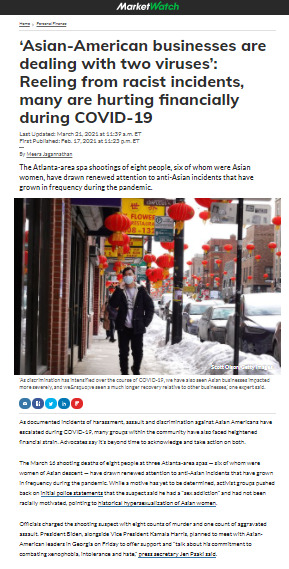 2021-03-21
2021-03-21‘Asian-American businesses are dealing with two viruses’
Reeling from racist incidents, many are hurting financially during COVID-19. The Atlanta-area spa shootings of eight people, six of whom were Asian women, have drawn renewed attention to anti-Asian incidents that have grown in frequency during the pandemic. As documented incidents of harassment, assault and discrimination against Asian Americans have escalated during COVID-19, many groups within the community have also faced heightened financial strain. Advocates say it’s beyond time to acknowledge and take action on both. -
 2021-03-18
2021-03-18Peru waves quarantine restrictions
Peru, which continues to suffer from high COVID-19 transmission rates, has lifted quarantine restrictions for international travelers. The Peruvian economy has been undermined by a loss of tourism, its affected restaurants, hotels, guides, transportation, and other facets that depend on foreign capital. The only catch is that you have to have a negative COVID-19 test 72 hours prior to arrival. All of this hints at the importance of money and influence after all-it's mostly wealthier travelers who would have the money to travel for leisure and access to COVID testing. But...what about everyone else on the plane? -
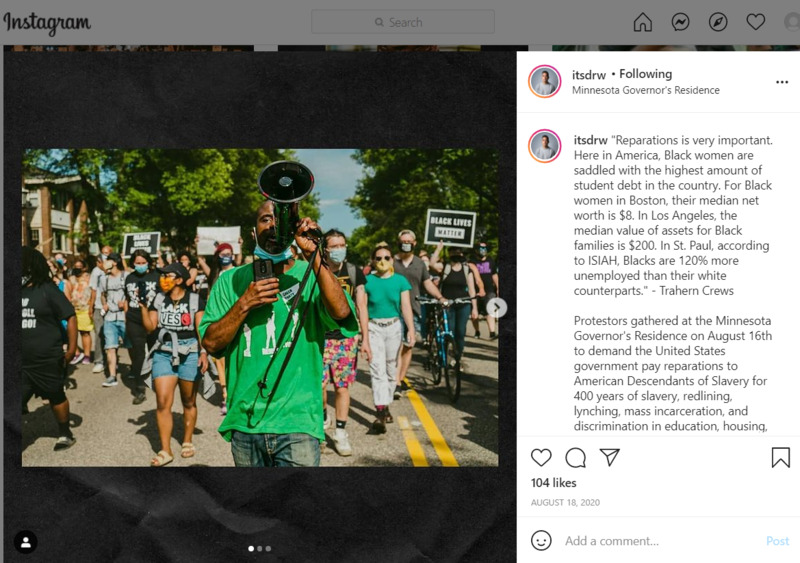 2020-08-18
2020-08-18Reparations in America
"Reparations is very important. Here in America, Black women are saddled with the highest amount of student debt in the country. For Black women in Boston, their median net worth is $8. In Los Angeles, the median value of assets for Black families is $200. In St. Paul, according to ISIAH, Blacks are 120% more unemployed than their white counterparts." - Trahern Crews Protestors gathered at the Minnesota Governor's Residence on August 16th to demand the United States government pay reparations to American Descendants of Slavery for 400 years of slavery, redlining, lynching, mass incarceration, and discrimination in education, housing, and employment. Photos from Reparations Rally In Honor of George Floyd, August 16, 2020 -
 2021-03-14
2021-03-14Ostara on a Budget
for Ostara this year, many of us will need to adjust our celebrations due to Covid-19. Many are feeling the loss of jobs, incomes, or stability this year. Lidia Pradas shares some inexpensive ideas to celebrate Ostara and welcome the new season. -
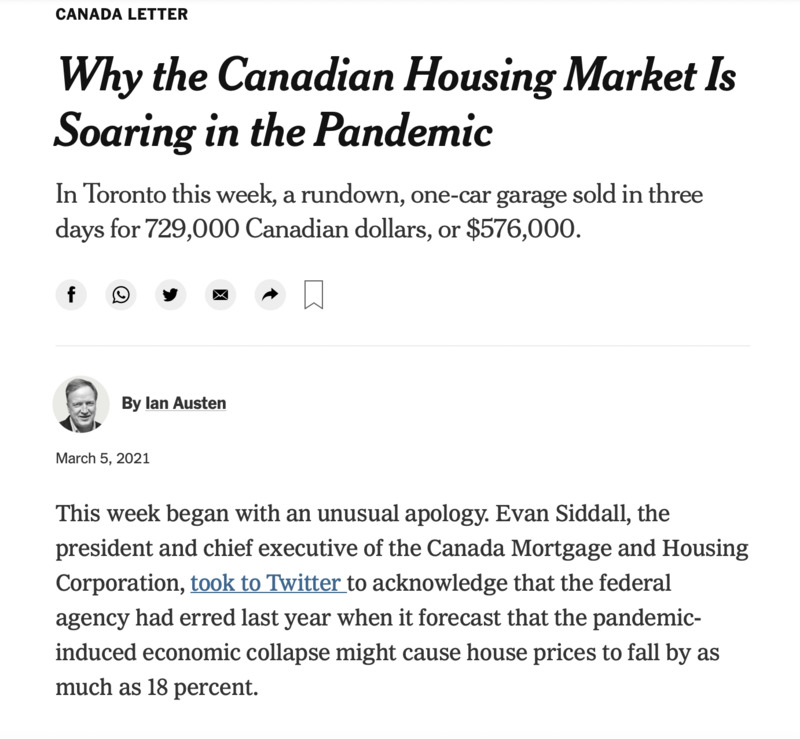 2020-03-05
2020-03-05Why the Canadian Housing Market Is Soaring in the Pandemic
"In Vancouver last month, the benchmark price for detached homes rose by 13.7 percent compared with a year earlier, reaching 1.6 million Canadian dollars. In the Toronto area, the average selling price for detached homes rose by 23.1 percent over the same time period, and a composite price that includes all kinds of housing topped 1 million dollars." -
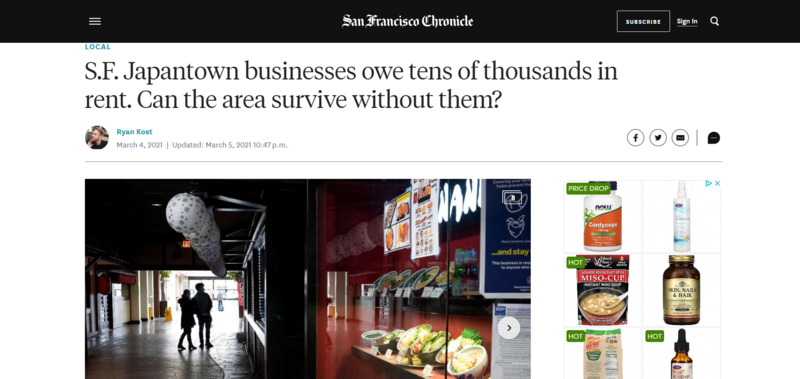 2021-03-04
2021-03-04S.F. Japantown businesses owe tens of thousands in rent. Can the area survive without them?
In the decades since, the community’s boundaries have shifted and shrunk, devastated by forced Japanese removal and internment in the 1940s and by large-scale redevelopment in the ’70s. But San Francisco’s Japantown persisted, even as others throughout the United States faded away. Today, Nihonmachi is the country’s oldest and largest Japantown, one of three remaining, but it covers only about six blocks — and many worry it is in danger of disappearing. The pandemic has hit neighborhood businesses particularly hard, and this year an agreement with the area’s largest landowner to keep the Japan Center malls “Japanese-themed” is set to expire. -
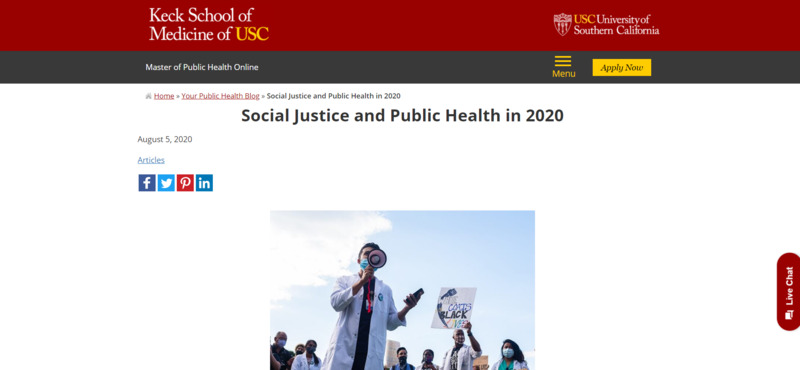 2020-08-05
2020-08-05Social Justice and Public Health in 2020
From the article: The COVID-19 pandemic, caused by the spread of the novel coronavirus, has created an unexpected and unprecedented lifestyle shift for many people across the globe. Several months into the pandemic, the public has been exposed to a number of issues they might not have previously considered or thought possible, from hospitals rapidly reaching capacity and the lack of personal protective equipment (PPE) to the mental and social challenges of physical distancing and being quarantined. -
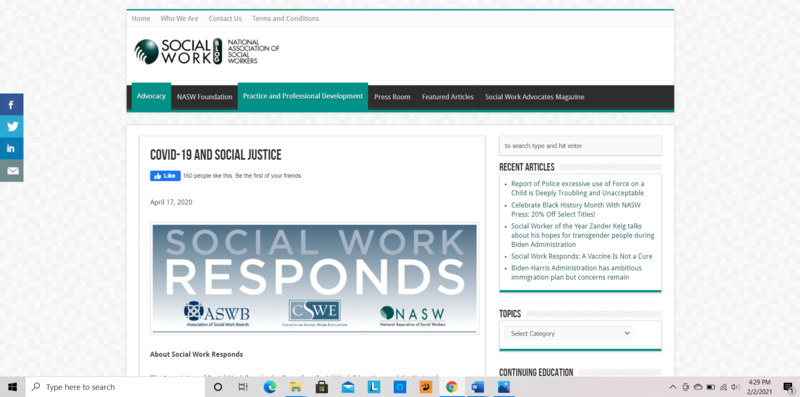 2020-04-17
2020-04-17COVID-19 and Social Justice
From the article: The COVID-19 pandemic is a health and mental health crisis, to be sure. But it is also a crisis of social injustice, inequitably affecting vulnerable and marginalized populations that include, among others, individuals who earn low incomes, or are incarcerated, homeless, in foster care, over 65 (especially those in long-term care facilities), people of color, or undocumented. Social work practitioners, educators, and policy makers are working to address the needs of these populations despite the unpredictability of the virus’s secondary impact on systems. -
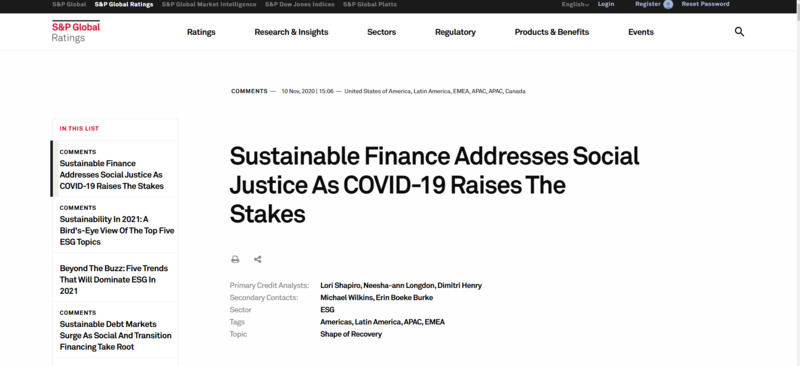 2020-11-10
2020-11-10Sustainable Finance Addresses Social Justice As COVID-19 Raises The Stakes
From the article: Economic shocks from the pandemic have widened existing inequities around the world, leading to calls for greater social justice in dealing with this health threat. Poorer people, minorities, and women are suffering disproportionately from growing health, housing, income, and education gaps under measures to contain COVID-19 that could set them back for years to come. To fund programs to address the problem, governments, supranationals, and corporations, among others, have accelerated issuance of sustainable instruments--including social bonds, where issuance jumped nearly four times so far this year to US$71.9 billion from the 2019 level. We think the sustainable debt market, partly because of the rapid rise in social bond issuance, could exceed $500 billion this year. -
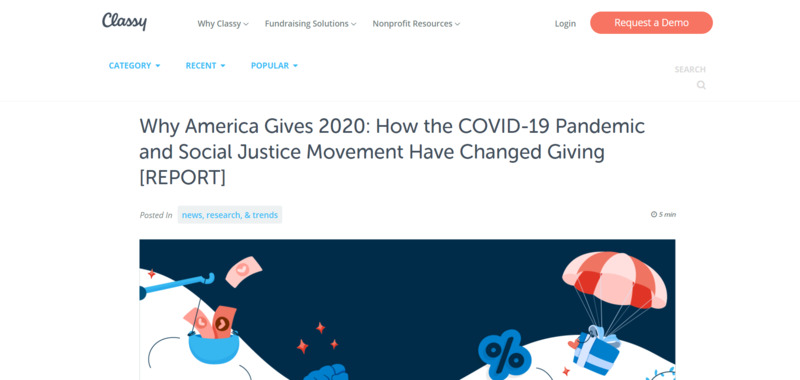 2020-11-19
2020-11-19Why America Gives 2020: How the COVID-19 Pandemic and Social Justice Movement Have Changed Giving [REPORT]
From the article: In previous years, Classy’s Why America Gives report has focused on consumer giving trends, what motivates donors to give, and their plans for Giving Tuesday and year-end giving. In our third-annual edition of Why America Gives, the 2020 report measures these year-over-year changes in giving sentiments and behaviors; in addition, it also analyzes how current events—specifically the COVID-19 pandemic and the social justice movement—have altered giving trends. -
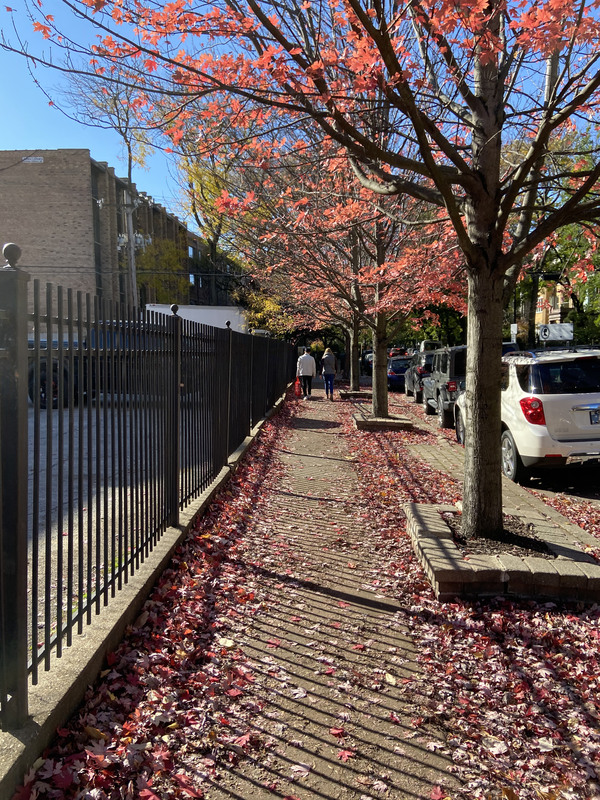 2020-09-25
2020-09-25A City Once Busy
I once used to walk this street on my way to work at a restaurant. I always loved how busy it was, seeing the streets overcrowded with people who had places to be. When I lost my job because of the pandemic in March I had to go home for 7 months. At the beginning I think we all thought that things would have turned around by the time the leaves started to fall. When I came back, I went downtown to visit the restaurant I had once worked at. The restaurant was boarded up still and the streets were mostly empty, and I felt kind of empty too. -
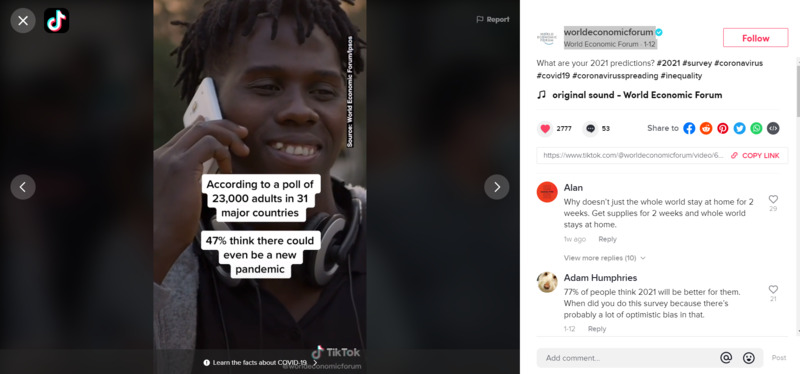 2021-01-02
2021-01-022021 Predictions
I actually agree with most of these predictions. I fear for the economy. I worry about the struggle people will face this year. -
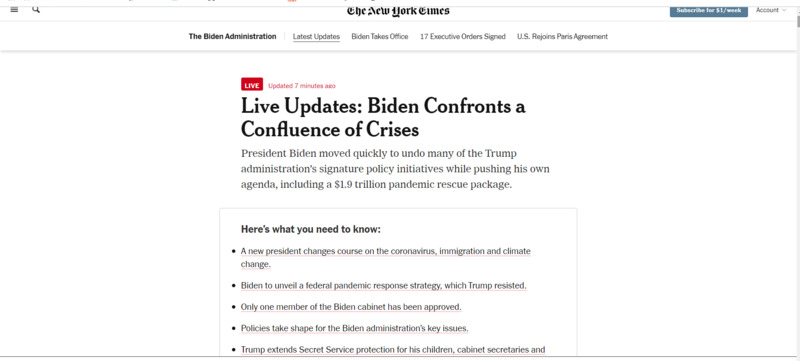 2021-01-21
2021-01-21Live Updates: Biden Confronts a Confluence of Crises
With a nation in crisis on so many fronts, reading this article today gave me the feeling I could maybe exhale for the first time in a long time. Biden is facing a disaster on the Covid front with vaccines running out in California and New York predicted to happen by the weekend. Biden will be busy the next few weeks, trying to repair the damage done to so many community's during the Trump administration. -
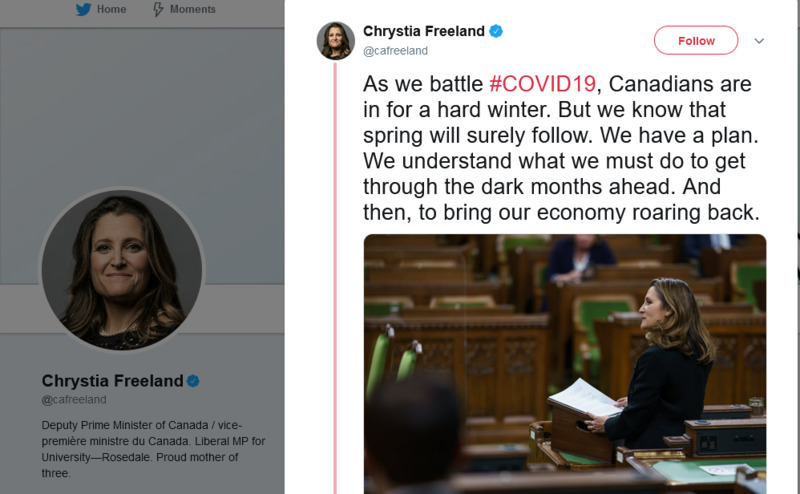 2020-11-30
2020-11-30Winter, then Recovery
This hopeful message from Canada's Finance Minister, Chrystia Freeland, says that Canadians have a plan to get through the winter, and then will move on to economic recovery. -
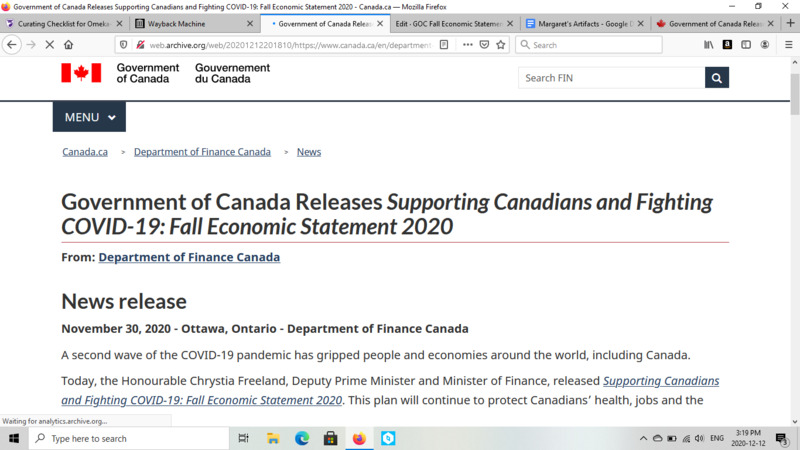 2020-11-30
2020-11-30GOC Fall Economic Statement
The Government of Canada's Fall Economic Statement. -
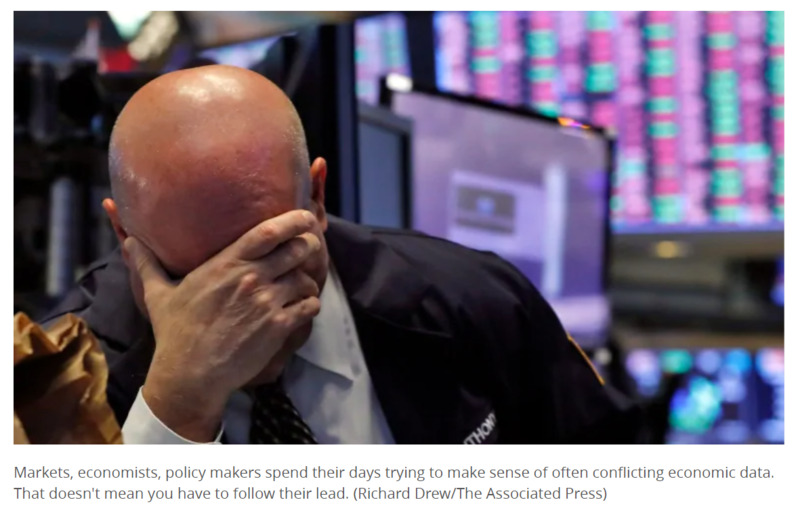 2020-12-05
2020-12-05Confused by the economy during the COVID-19 pandemic? Don't worry, so are the economists
Making sense of the world's economic crisis, optimistic outlook for Canada. -
 2020-12-12
2020-12-12'We're not going to have a Christmas,' says woman told to repay $18,500 in CERB by year's end
Article about a woman told to pay back 18,500 dollars worth of CERB- exemplifies fallout from unclear application criteria of CERB. -
 2020-09-01
2020-09-01Second Wave (Debt)
This cartoon points out fears of national debt. -
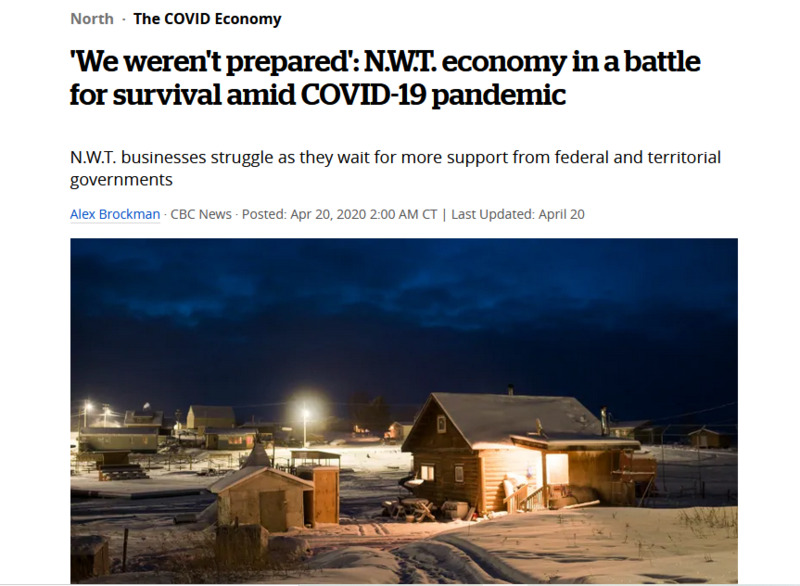 2020-04-20
2020-04-20NWT Economy
Article describing the economic battle faced by the Northwest Territories. -
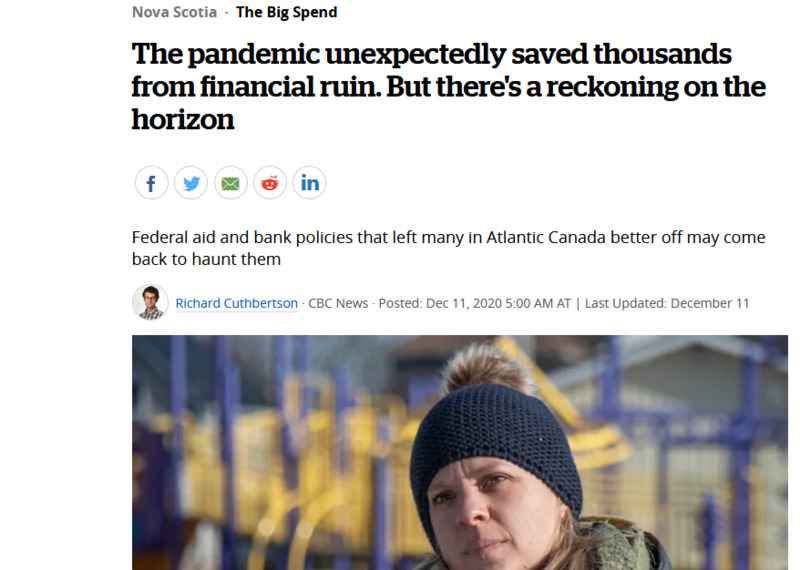 2020-12-11
2020-12-11Post-pandemic Reckoning
This article talks about the financial worries Canadians are facing as the pandemic and government supports lift. -
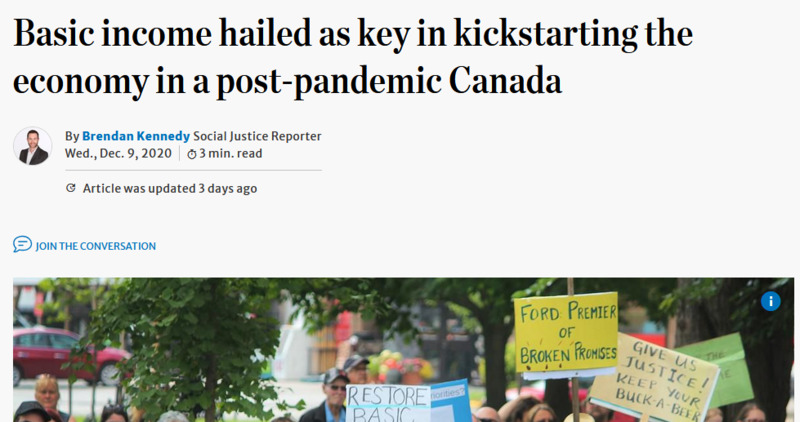 2020-12-09
2020-12-09Basic Income as Economy Kickstart
This article discusses new interest in introducing a universal basic income to Canada, and how it could help the economy. -
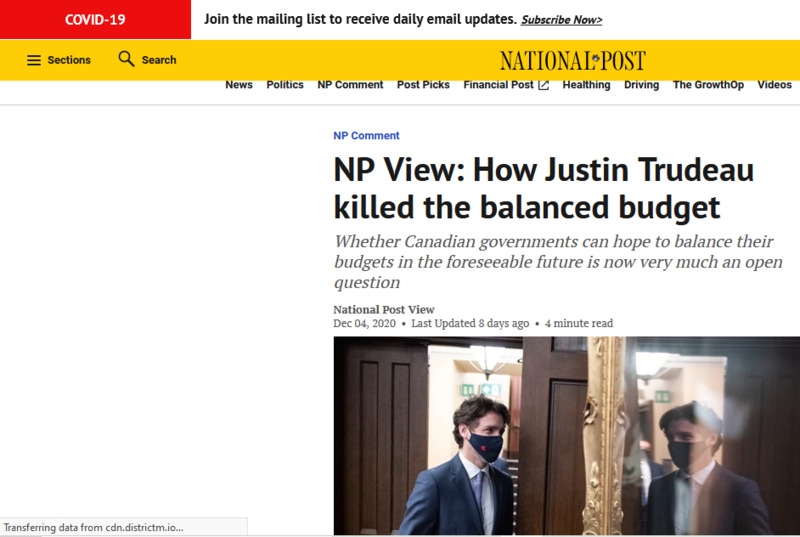 2020-12-04
2020-12-04NP View: How Justin Trudeau killed the balanced budget
An article talking about national debt and speculating that the pandemic has changed attitudes towards national finance. -
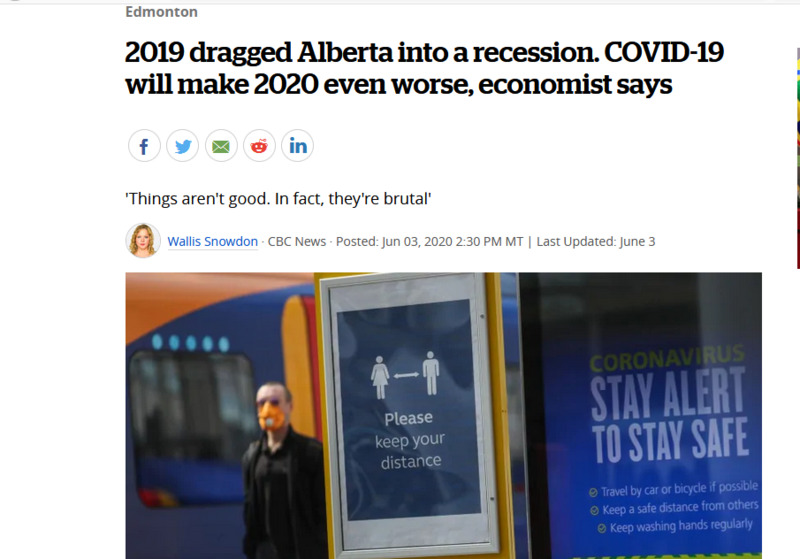 2020-06-03
2020-06-03Alberta Recession
This story is an example of the kind of recessions formerly rich provinces are facing. -
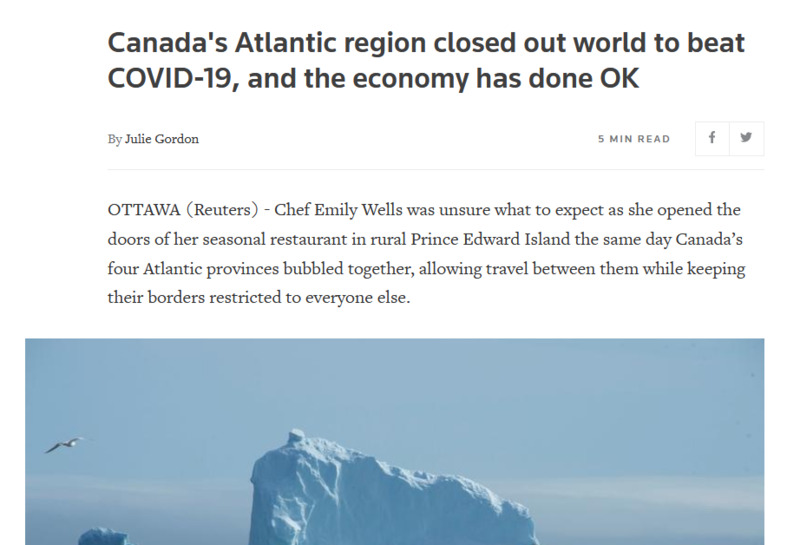 2020-10-25
2020-10-25Atlantic Canada Bubble
This article discusses how the Atlantic Canadian economy fared during the pandemic.
